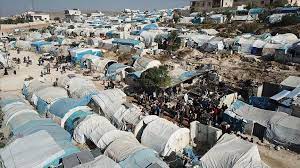 By Annisa Essack
By Annisa Essack
01:03:2022
The JUSA team are on their second day in the blessed lands of Sham and Ml. Habib Bobat, a member of the delegation, describes their situation yesterday as they visited different places and met with interesting people with experiences and stories to tell.
Ml. Habib reflected on the phase of the war experienced presently for Syrians as they embarked on rebuilding their lives and cities.
It also brought home for him the value of prayer, especially as he has been touched by the people tainted by the consequences and sufferings of the Syrians.
He met “Habibi” during the visits, who says that the war started more than 11 years ago in Daraa City, Syria’s south. The revolution began as other cities followed.
The city of Idlib, closer to Turkey, is crowded with displaced people; however, previously, the area was sparsely populated and wasn’t attacked by Assad’s regime. Habibi says the opposite is true for neighbourhoods further inside Idlib, the hotspots.
He alluded to more than 1 million “shaheed” or martyrs and a million prisoners in the regime prisons, more than 200 000 orphans, more than 50 000 widows and over 200 000 disabled people.
Habibi revealed that Muslims were not allowed to pray; Assad’s family and regime utilised monies from oil sales. None was used toward the countries, but instead, citizens were made to pay high taxes.
Having had dreams of completing his studies before travelling to Saudi Arabia to build his future, there was little hope for a future for people in Syria.
He added, emotionally, that people have made an enormous sacrifice, but he and others feel that it was worth it as people would work without satisfaction, and there was always the threat of losing one’s Deen. He asserts that Allah has provided the people with the freedom to live and practice Islam.
Habibi says that the war will not stop, primarily as Iran and Russia support Assad, and more than a million people have been killed. He says people will remain in the country to rebuild it.
Habibi is from Homs but chooses to live in Idlib to live as a Muslim. He prefers to be away from the regime that has robbed them of their families and futures.
He referred to Singapore, having risen from the ashes to prosperity, saying that people want their freedom, which is more expensive than food.
Most poignant was his tawaqqul, his belief in God as he says, “You come from thousands of kilometres from South Africa to help these people. Allah (SWT) will use someone like you to serve these people. Allah (SWT) will not forget us.”
Regarding how widows, orphans and those with abilities survive without employment, Habibi says that the people within the camps help each other, and international organisations also take care of them.
Habibi says many refugees who live under the challenging conditions of the camps were once farmers, etc. Habibi says he was a student of English, his father a merchant, but they lost everything.
Speaking about the camps, he says there is much hope that the tents will be gone in the next two years as more projects develop and create better living spaces for the people.
Ml. Habib referred to Habibi as a “very interesting” individual, but having listened to him, I felt inspired, motivated and renewed in my faith, algamdoelillah.
[LISTEN] to the podcast here.







0 Comments